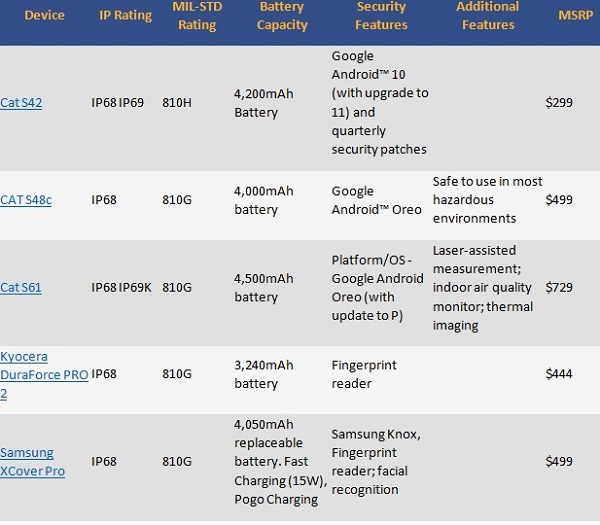The mobile phone has become far more than a personal device for remote workers. In the 2020 Construction Technology report from JB Knowledge, 93 percent of construction industry workers surveyed used their smart phones for work. Mobile apps have exploded, and the phone provides access to productivity-boosting tools for documenting work progress, accessing project plans, dispatching and payroll. The functionality of these devices continues to expand with devices such as the Cat S61 incorporating thermal imaging technologies, an indoor air quality sensor and laser-assisted measurement. Make no mistake – the smart phone is a critical tool on the jobsite.
The majority of the industry’s 7.5 million workers spend a considerable amount of time in the field, often facing the elements, many working at heights and without access to a traditional power source. What construction field workers are looking for from a smart phone is something that is waterproof, shockproof, and drop-proof, with a long-lasting battery.
Considering that more than a third of cell phones are damaged in use1, it’s not surprising that rugged smart phones are finding their way onto the jobsite. According to Caterpillar, the bring your own device trend across mobility, sees employees purchasing their own choice of handset, with the expectation that they will be able to use its features for work.
An industry standard rating system helps buyers identify devices with the best ingress protection. A rating of IP68 means the device is fit enough to withstand dust, dirt and sand, and is resistant to submersion up to a maximum depth of 1.5m underwater for up to thirty minutes. A rating of IP69 can also withstand high-pressure, high-temperature jet sprays, steam-cleaning, or washdowns.
Another standard buyers can use to evaluate smart phones is based on military specifications for testing equipment developed by the Department of Defense. Manufacturers who want to demonstrate a level of ruggedization beyond IP ratings can conduct environmental lab testing according to the MIL-STD-810 standard to validate their product’s durability.
Another useful feature for construction field workers is a screen that can be read in direct sunlight. The Cat S42’s super bright 5.5″ HD+ 18×9 display allows for this and is protected by scratch resistant Corning® Gorilla® Glass. Its touch screen can be controlled with wet fingers or when wearing gloves.
Battery life is important when in the field. The Samsung XCover Pro, introduced in January 2020 features pogo pin charging support and compatibility with third-party charging docks to ensure the phone is powered as soon as the workday begins, and a 4,050mAh battery lasts long after the day is done. Cat smart phones also feature batteries that remain powered well beyond a typical day’s use.
PROTECTING VALUABLE BUSINESS DATA
Reports, such as Verizon’s Mobile Security Index, detail the threats facing companies globally. According to Verizon, one of the first steps a company can take to ensure devices are secure is to take a mobile security assessment. The right network security, device management, and mobile threat defense are key to keeping sensitive material and information safe and out of the wrong hands. Solutions such as Samsung Knox offer advanced security features like hardware-backed protection, data isolation and encryption and boot- and run-time protection to ensure that business-critical information is protected against intrusion, malware and other threats.
Cat’s rugged smartphones support Google’s Android Enterprise (AE) feature set. Using these tools in conjunction with an enterprise mobility management (EMM) solution, businesses can manage the devices used for work by their employees. This includes securing sensitive data, and ensuring devices are set up correctly to maximize productivity. Cat also conducts provisioning testing with leading EMM solutions such as SOTI MobiControl, VMware Workspace One (Airwatch), IBM MaaS360, Mobile Iron, and 42Gears Sure MDM.
5G IS TRANSFORMING CONSTRUCTION
5G is the 5th generation of mobile cellular communications, which first launched in April 2019. With faster data speeds, greater reliability and massive capacity, 5G connects users, machines, and devices anywhere operations are being conducted. The use of new sensors and 5G is enabling material tracking and dispatching technologies and technical support can be done visually in real-time, reducing dependence on technicians or managers on-site.
“The new smart construction sites bring vast benefits through adoption of AI and big data,” said a spokesperson for Cat phone. “Some useful benefits are better safety and compliance, mitigation of risk and a reduction of security concerns.”
FEATURED RUGGED SMART PHONES

1 Source: Bullitt Group Research and YouGov, Damage Report 2017, (5,130 Respondents)
About the Association of Equipment Manufacturers (AEM)
AEM is the North America-based international trade group representing off-road equipment manufacturers and suppliers with more than 1,000 companies and more than 200 product lines in the agriculture and construction-related industry sectors worldwide. The equipment manufacturing industry in the United States supports 2.8 million jobs and contributes roughly $288 billion to the economy every year.
About CONEXPO-CON/AGG
Held every three years, CONEXPO-CON/AGG is the must-attend event for construction industry professionals. The show features the latest equipment, products, services and technologies for the construction industry, as well as industry-leading education. The next CONEXPO-CON/AGG will be held March 10-14, 2020 in Las Vegas, Nevada. For more information on CONEXPO-CON/AGG, visit https://www.conexpoconagg.com.




























